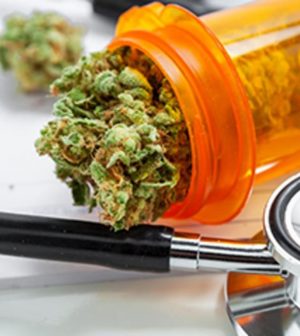- Could Your Grocery Store Meat Be Causing Recurring UTIs?
- Are You Making This Expensive Thermostat Error This Winter?
- Recognizing the Signs of Hypothyroidism
- 10 Strategies to Overcome Insomnia
- Could Artificial Sweeteners Be Aging the Brain Faster?
- Techniques for Soothing Your Nervous System
- Does the Water in Your House Smell Funny? Here’s Why
- Can a Daily Dose of Apple Cider Vinegar Actually Aid Weight Loss?
- 6 Health Beverages That Can Actually Spike Your Blood Sugar
- Treatment Options for Social Anxiety Disorder
More Americans With Diabetes Are Turning to Marijuana

As marijuana loses much of its stigma and laws around its use relax, Americans are increasingly consuming it medically and recreationally.
Americans with diabetes are no exception, a new study finds.
The number of adults with diabetes who said that they’d used cannabis at least once over the past month jumped by a third between 2021 and 2022, the new report found.
This surge in use means that “clinicians must discuss with their patients with diabetes the potential harms of cannabis use on diabetes-related outcomes,” even as the merits of marijuana for diabetes care remain unclear, wrote a team from the University of California, San Diego (UCSD).
The findings were published July 22 in the journal Diabetes Care.
The new study was led by Dr. Benjamin Han, associate chief of research in the Division of Geriatrics, Gerontology and Palliative Care at UCSD.
His team looked at federal data from the 2021-2022 National Survey on Drug Use and Health.
During that time, about 9% of adults with diabetes said they’d used cannabis at least once over the prior month, and the rate rose from 7.7% in 2021 to 10.3% in 2022, a 33.7% rise.
Users tended to be younger: “Nearly half [48.9%] of the people with diabetes who used cannabis were under age 50,” the team noted.
Use was nearly three times more likely if people lived in a state where marijuana was legal, and a history of major depression also increased the odds that a person with diabetes would use the drug.
Use of illicit drugs or heavy alcohol use also heightened the odds that a person with diabetes might use cannabis, Han’s team found.
That could prove to be a toxic mix for people battling diabetes, the researchers warned.
“In addition to cannabis, use of some substances, including tobacco and excess alcohol use, are established risk factors for cardiovascular disease and could impact glucose metabolism,” they explained. “Additionally, cannabis may complicate diabetes management, adversely affecting glycemic control and self-management behaviors.”
All of this means that doctors need to ask patients with diabetes about their use of marijuana and other substances.
“Our results emphasize the importance of comprehensive substance use screenings in diabetes care, with a specific focus on cannabis,” Han and his colleagues wrote.
More information
Find out more about the care of type 1 and type 2 diabetes at the American Diabetes Association.
SOURCES: Diabetes Care, July 22, 2024; University of California, San Diego, news release, July 22, 2024
Source: HealthDay
Copyright © 2026 HealthDay. All rights reserved.










